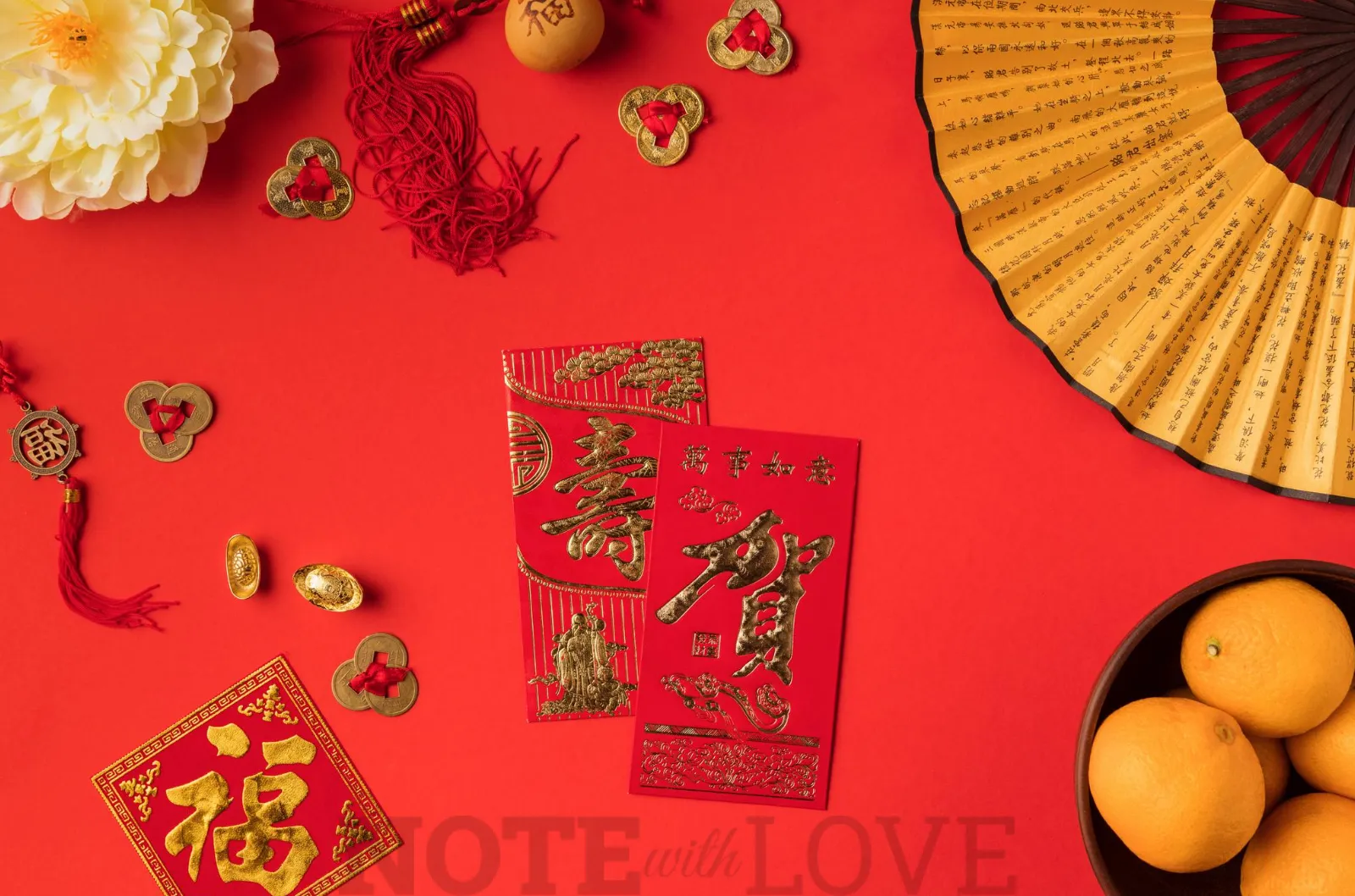- Friend
- Family
- New Year
- Celebrations
- Family
- Party ideas
- New Year
Chinese New Year 2026 - How To Celebrate Traditionally
by Note with Love Team - Jan 25, 2026
Introduction
People of Chinese descent all over the globe celebrate Chinese New Year, also known as the Spring Festival or the Lunar new year. In some East Asian nations, it is a significant event that heralds the start of the year. People gather with their families, exchange gifts, and observe many other traditions during this time of year. Chinese New Year is a state holiday since 2022 in California only. Since the holiday is premised on the lunar calendar, which is rooted in the cycles of the moon, its exact date varies every Chinese year.
When Is The Chinese New Year In 2026?
The lunar new year is premised on the lunar calendar, which follows the cycles of the moon. Thus, its exact date varies every year on the Gregorian calendar, which most of us are familiar with. However, it is usually between January 21 and February 20.
Chinese New Year 2026 falls on Tuesday, February 17th, 2026, marking the beginning of the year 4724 in the Chinese Calendar. With 16 days of several cultural rituals and festivals the celebrations culminate with the Lantern Festival on March 3rd, 2026.
2026: Year Of The Horse
The year of the Horse officially starts on February, 2026, as the year of the Snake comes to an end. In the Chinese Zodiac, the Snake is the sixth animal.
In the Chinese zodiac, 2026 is the Year of the Horse, a symbol of energy, freedom, and forward momentum. The Horse is the seventh animal in the 12-year zodiac cycle and represents passion, ambition, and independence.
In Chinese mythology and culture, the Horse is respected for its strength, confidence, and tireless spirit. People born in Horse years are known for being energetic, goal-driven, and adventurous. They enjoy challenges and are natural risk-takers who prefer action over hesitation. Horses think fast and move fast, often trusting their instincts when making decisions.
However, Horses can also be impatient and stubborn. They do not like being controlled and may lose interest easily. This can sometimes affect their relationships or long-term goals.
People born in Horse years, such as 1930, 1942, 1954, 1966, 1978, 1990, 2002, 2014, and 2026, are friendly and confident. They enjoy being around others but also value their personal freedom.
Overall, the Year of the Horse encourages bold moves, personal freedom, and rapid progress. It is a powerful year for pursuing ambitions, embracing change, and moving forward with courage and confidence.
Chinese Zodiac and Animals - How Are They Related?
According to popular belief, the Chinese zodiac has existed since the Han Dynasty (202 BC-220 AD). Each of the 12 animals from the Chinese zodiac is associated with a particular year. These animals are connected with the legend of the Great Race, in which the Jade Emperor invited all the animals to compete where they were ranked in accordance with the order in which they crossed the finish line, with the rat coming in first.
Here is the order of the animals in the Chinese zodiac:
- Rat
- Ox
- Tiger
- Rabbit
- Dragon
- Snake
- Horse
- Goat
- Monkey
- Rooster
- Dog
- Pig
These animals are thought to have specific qualities and traits. According to the belief, people who were born in a particular year are said to possess the personality traits of that animal. Each animal corresponds to a particular element, and it is thought that the element of the year in which a person is born has an impact on their luck and personality.
How Long Is The Chinese New Year Celebrated For?
The lunar year is approximately 11 days shorter than the solar year. Each month in the lunar calendar starts on the day of the new moon, and the lunar year starts on the second new moon following the winter solstice. However, Chinese new year usually occurs in January or February.
The Chinese new year is celebrated for up to 16 days (inclusing new year's eve) in China. The celebration begins on the first day of the lunar new year, with the first seven days being public holidays, and ends on the 15th day with the Lantern Festival. In other parts of Asia, the celebrations vary in duration.
Let's take a dive into the traditional festivities that will be observed this year to celebrate the lunar new year.
The Laba Festival (Jan 26th)
Traditionally, everything kicks off on January 26th with the Laba Festival. It is a time for memorial services and prayers to the gods and ancestors for good luck and a bountiful harvest. Although the festival has pagan roots, it has been incorporated into other faiths like Daoism and Buddhism.
Laba porridge is served as the main dish along with Laba tofu, noodles, and wheat kernel rice during the Laba Festival. Additionally, eating ice on this day is also thought to prevent stomachaches for the rest of the year.
The Little Year (Feb 10th)
Starting of main festivities. It’s the opening celebration of the Chinese New Year, scheduled for February 10, 2026, usually about 7 days before the New Year's Day. It is a day dedicated to memorial and prayer rituals, which also include cleaning the house to drive out bad luck and saying a prayer to the god of the stove.
On this day, special foods like sugar melons, stove candy, baked wheat cakes, and tofu soup are customarily devoured.
New Year's Eve (Feb 16th)
This is basically the New Year's Eve. It is the time when families gather around for the annual reunion dinner and when families stay up late after dinner to ring in the new year. It is particularly enjoyable to the children as they receive red envelops with gift token or money.
Spring Festival (Feb 17th–Feb 27th)
The Spring Festival on New Year's Day is the centerpiece of the Chinese New Year celebration. It's a day for setting off firecrackers, saying hello to, and blessing your neighbor. Each day of the Spring Festival has its own set of activities and traditions. Such as –
- February 18th is the day when married daughters are expected to visit their parents' house with their husbands and kids
- February 19th is the Day of the Rat. Folks leave grains and crackers in corners for rats to share in order to keep them from bothering humans throughout the year.
- February 20th, Day of the Sheep, a day for praying to the god of wealth offering meat, fruits, and wine. Sheep slaughter is prohibited on this day.
- February 21st is Break Five, a day for markets and stores to reopen and for women to give new year blessings.
- February 22nd, Day of the Horse, a day for praying to the kitchen god
- February 23rd, Day of the Human is a day for praying to the god of happiness.
- February 24th, Day of the Millet is a day for praying to the god of wealth and fortune
- February 25th is Providence Health, a day for paying respects to the Jade Emperor.
- February 26th is Stone Festival, a day for house cleaning
- February 27th is Son-in-law Day, a day for visiting relatives when a father invites their daughter and son-in-law to dinner.
Lantern Festival (Feb 28th–Mar 3rd)
The Lantern Festival commences on the 15th day of the Chinese calendar year which is March 3rd, 2026. People make lanterns and play games like Lantern Riddles and moon-gazing during the festival. According to Chinese mythology, lighting lanterns can increase the fertility of Chinese families and bring good fortune. Chinese families participate in a series of activities during the festival, which can be summarized by the following rhyme:
Make noise on the 11th, build light sheds on the 12th, light the lantern on the 13th, light is bright on the 14th, a full moon on the 15th, end the light on the 16th
How Do You Say Happy New Year In Chinese?
“Happy new year” in Chinese is "新年快乐" (xīn nián kuài lè) or "新年好" (xīn nián hǎo), which means “new year well”. Another way you could say it is "恭喜发财" (gōng xǐ fā cái), which means "Congratulations, and may you be prosperous."
Top 10 Traditions To Celebrate The Lunar New Year
The top ten traditions typically observed to mark the Lunar new year are listed below:
- Cleaning the house: Cleaning the house before the Lunar new year is thought to sweep away the evil eye and bad luck from the previous year.
- Decorating with red: In Chinese culture, the color red represents good fortune and prosperity. Red lanterns, paper cuts, and couplets are used to decorate homes in order to welcome luck for the coming year.
- Fireworks and firecrackers: Loud noises are thought to ward off evil spirits and bring good luck. During the Lunar new year festivities, firework displays and crackers are quite often lit.
- Reunion dinner: The reunion dinner, which takes place on new year's Eve, is the most significant meal of the year. It is a time when Chinese families gather to welcome the new year.
- Giving red envelops: Red envelops are given to children as a symbol of luck and prosperity. These are called "hongbao," or red envelopes. Typically, the envelopes are filled with money.
- God-worshipping: During the new year, many people go to temples to pray and make offerings of various meats, fruits, and wines to the gods.
- Paying respects to ancestors: A lot of families go to shrines to pay their respects to their ancestors and to pray for good luck in the future year.
- Hanging up spring couplets: Spring couplets are a pair of poetic phrases that are hung up on walls or doors and are traditionally written on red paper. They are intended to bring good fortune and happiness to the home.
- Dragon and lion dances: The dragon and lion dances have a rich cultural history in China and are a treasured aspect of the new year festivities. Both the dragon and lion dances include music, acrobatics, and other spectacle elements. Both performances are intended to bring the community good fortune and prosperity.
- Eating lucky foods: Some foods are traditionally eaten during the Lunar new year and are thought to bring good luck. Fish, Nian Gao (sticky rice cake), and dumplings are some of them.
Here's an infographic on these made by our team.
Special Food Items On The Chinese New Year
At the gatherings, family members eat specialties that are said to bring prosperity, joy, and fortune. Some of the most popular dishes served at the Spring Festival are –
- Nian Gao(年糕 - nián gāo), a traditional Chinese dish made of sticky glutinous rice or yellow rice. In southern China, it is typically savory, while in northern China, it is sweet. As nian gao sounds similar to the Chinese word for "high" or "tall," it's thought to bring success and good fortune. It is often steamed or boiled, but it can also be pan-fried or deep-fried. Nian gao comes in a wide variety of flavors, such as white nian gao, jujube nian gao, and hundred fruit nian gao.
- Hot pot, a traditional Chinese dish consists of a bubbling pot of broth accompanied by raw meat and vegetables. The broth and the dipping sauce add flavor to the dish, which can be made by combining ingredients such as sesame paste, egg, cilantro, and peppers.
- Spring rolls, which resemble gold bars and represent prosperity and wealth, can be deep fried, steamed, or baked and stuffed with a variety of items such as pork, Bok choy(Chinese cabbage), and shrimp.
- Dumplings, which can be steamed or pan-fried and are shaped like ancient Chinese silver and gold ingots to represent the exchange between the old and new year.
- Steamed fish, which represents abundance and prosperity, is often served whole with the head and tail intact and should be eaten.
- Steamed chicken, must be included in the menu as it represents a successful start to the new year and is frequently served whole.
Myths About The Lunar New Year
The Monster and new year's Eve: Every year, a monster by the name of Nian would descend to gorge itself on both people and animals. Red and raucous noises both scared it away.
Evil Spirits and Poetry: Spring Festival couplet poems (春联 / chūn lián) were placed on doors to ward off demons who prowled the streets at night looking for trouble.
Fortune is here!: As a decoration, the word "fu", which means fortune or happiness, is written upside down on red paper. The tradition began when an illiterate family explained why they wrote it upside down, and the Emperor accepted their justification.
Dumplings and Ears: While some claim that dumplings have the appearance of gold and silver ingots, others assert that they resemble ears. The latter notion might be a result of a myth involving the goddess Nǚwā. She made the dumplings to commemorate the creation of humans, which she shaped into ears.
Malt Candy: A traditional new year's treat, malt candy is regarded as bringing prosperity and well-being. The candy comes in a variety of shapes, including animals, flowers, and plants, and is believed to bring unique blessings for the new year.
Celebrations In The United States
In the United States, different communities observe the Chinese new year in a variety of ways.
San Francisco's Chinatown hosts the most well-known celebrations, which include parades, dragon and lion dances, and other cultural activities and performances.
Numerous celebrations and events are also held in other cities with sizable Asian populations, such as Los Angeles, New York, Seattle, and Houston. A lot of schools and community organizations also host celebrations for the holiday, including craft fairs, cultural shows, and food festivals. A lot of cultural institutions like museums have displays and educational programs dedicated to the Chinese new year.
Concluding Thoughts
The Chinese new year celebration offers people from all walks of life the chance to become more aware of and appreciative of the culture. Overall, it's a time for getting together with family and friends, engaging in cultural exchange, and honoring tradition and heritage.
Trending in Notes
If I had a dollar for every time you’ve made my life better, I’d be the richest person in the world. Here’s to you, my love—happy birthday!
I may have taken you for granted at times, and things may have been tense or uncomfortable recently. But I do want you to know how much I value you and how happy I am to have you in my life. This Thanksgiving I am thankful that I have you.
You May Also Like


- Celebrations
- Family
- Friend
- New Year
New Year's Eve Traditions: Try For A Lucky New Year 2026

- Family
- Christmas










